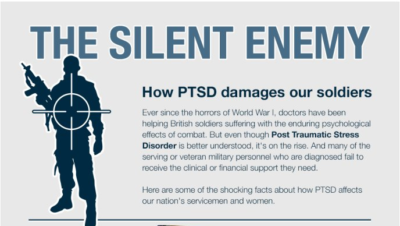What Is Post Traumatic Stress Disorder (PTSD)?
This blog was sent to me by Johnson Law, Injury Lawyers; they proposed that British troops are preparing to pull out of Afghanistan by the end of the year. Johnson Law's representative said "PTSD cases look to grow by 12% over the next few years. The condition can have severe and devastating effects for the 11,000 serving military personnel who are currently diagnosed, but as over 93% of veterans are embarrassed of their problem, the real number is significantly higher."
If you have served in the military and you have a loved one who has, you may find this interesting. Please pass this on, we know our troops suffer from PTSD but as Johnson Law suggests; far more than we know suffer from this!
We Are All Responsible For Sending The Message That There Is No Shame Or Weakness In Mental Health.
Post traumatic stress disorder (PTSD) is an anxiety disorder and severe emotional reaction caused by very stressful, traumatic, frightening or distressing events such as a life threatening event.
The type of events that can cause PTSD include:
Military injuries or combat
Serious road traffic accidents
Terrorist attacks
Natural disasters, such as severe floods, earthquakes or tsunamis
Being held hostage
Witnessing violent deaths or a major accident
Violent personal assaults, such as sexual assault, mugging or robbery
PTSD can develop immediately after someone experiences a disturbing event or it can occur weeks, months or even years later. PTSD can develop in any situation where a person feels extreme fear, horror or helplessness whether they have had an serious road traffic accident, involved in a serious accident at work, violent assault at work, etc.
PTSD affects up to 30% of people who experience a traumatic event. It affects around 5% of men and 10% of women at some point during their life. PTSD can occur at any age, including during childhood. PTSD may affect your ability to drive safely, so you need to inform the Driver and Vehicle Licensing Agency (DVLA) about your condition.
Post Traumatic Stress Disorder Symptoms
Someone with PTSD can experience:
Reliving the traumatic event through nightmares and flashbacks or bad memories
Feelings of isolation, irritability, anger and guilt
Difficulty forming close relationships
Chronic illness such as headaches, stomach upsets, dizziness, chest pain and general aches and pains, and a weakened immune system
Problems sleeping, such as insomnia
Difficulty concentrating.
Avoidance of being in same situation again (avoid driving)
Refusing to discuss experience
Guilt (especially if someone else died)
Sweating and shaking
Difficulty breathing (anxiety, heart palpitations, panic attacks)
Depression
Phobias
These symptoms are often severe and persistent enough to have a significant impact on the person's day-to-day life. In most cases the symptoms disappear in the days and the weeks following the event. But some people have such severe symptoms they will find it difficult or impossible to lead a normal life.
Claiming Compensation For Post Traumatic Stress Disorder (PTSD)
If you or a loved one are suffering from PTSD then call Johnson Law Solicitors today. We have over 50 years personal injury experience dealing with cases for post traumatic stress disorder compensation.
We have successfully brought cases to a successful conclusion and got the right level of compensation for this disorder for our clients, together with loss of earnings, future loss of earnings, payments for any future medical assistance and possible future PTSD rehabilitation costs to help you recover from this debilitating illness.
We will ensure your case is handled sensitively and by an expert PTSD claims lawyer. We can arrange for you to be put in touch with local support groups to assist you in your recovery.
Call us for free legal advice and help today on 0800 130 0699 or complete our online claim form.
More PTSD Resources & Support
NHS Website Information from the National Health Service, dealing mainly with recognising and treating PTSD.
NICE (National Institute for Health & Care Excellence) Clinical guidelines about the healthcare standards, treatment, support and information PTSD sufferers can expect to receive.
Royal College of Psychiatrists Fantasic, in-depth article about PTSD. Learn more about how PTSD starts, what it feels like, comparisons with ordinary stress and much more.
Mind Mental Health Charity More information from one of the top mental health charities in the UK. Mind offer coping strategies and useful contacts for dealing with PTSD.

